Why Indians Should Visit Egypt
Not just are the Egypt monuments awe inspiring, they also conveyed many messages and lessons. What differentiates the two great civilisations - Hindu civilisation and Egypt civilisation?
Total Views |
Like all Indians, I too had an attraction for Egypt as one of the oldest civilisations of the world. There is a natural curiosity about ancient civilisations like Egypt, Jordan, Persia among us Bharatiyas. Infact, till Hindus began asserting their history, Egypt was supposed to be the oldest civilization. Pyramids are around 5000 year old, famous Karnak temple is 4000 year old and Luxor temple is around 3400 year old. So, we can say from archaeological evidence that it is our contemporary civilisation as Harappan civilisation is around 6000 year old, while some recently found archaeological artefacts have been found to be 8000 year old.
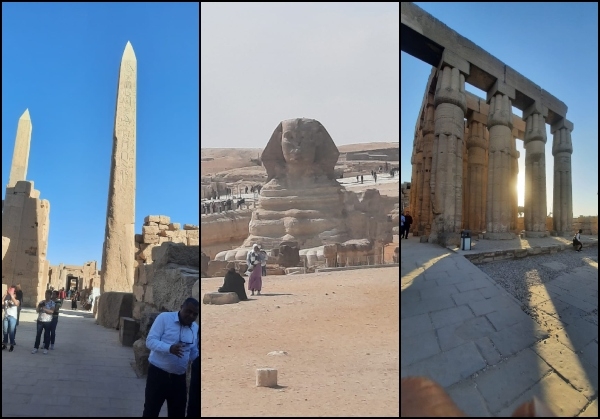
And I was not disappointed. The grandeur of the temples with huge tall columns and beams on their top, wonderful etched paintings and the exquisite sculptures remind you of our own grand ancient temples, sculptures in Ellora caves, Konark, Mahabalipurm and Brihadeshwar etc.
Not only the technological skills and art of the ancient Egyptians and their life sciences are stunning, their spirituality like all other ancient traditions and cultures is quite close to Hindu philosophy. Respect for nature, deep curiosity about life and life after death, worshipping natural elements as the fountainhead of life are similar to our own Rishis’ views. The mutual respect of the priesthood and kings, dignity of women, their importance in spiritual and material life evident in their work and are similar to Hindu civilisation.
Surprisingly, the symbol of creation, the presentation of God that the Egyptian queen saw in her meditative state is Obelix - the tall columns that you see in their temples with four sides and pyramid like pointed top. In case of Hindus, the column with most powerful energy with no beginning and end is symbolised as Shivling. Geometrically, slightly different, but common imagery of huge column of energy is striking.
Not just are the monuments awe inspiring, they also conveyed many messages and lessons. What differentiates the two great civilisations?
From what I could gather - the view of life and death. They were not afraid of death; they were matter of fact about it. Egyptians stopped at material readiness for life after death, with Kings making elaborate plans for their life after death, with deeply dug secret chambers for their graves, the chambers storing all the materials like throne, eatables, other items of necessities for the king to live a good life after death, including graves for their servants in the same vicinity so they would serve them in afterlife. (Earlier the servants would sacrifice themselves to be with the king. Later, it is said, they would be forcibly killed and laid to rest along with the king.) Richer the king, more luxurious the chamber for his grave. Mummification of bodies was part of this philosophy. They not only mummified the king, queens and priests, they also mummified their respected and also pet animals/ birds. They worshipped some animals as image of their gods.
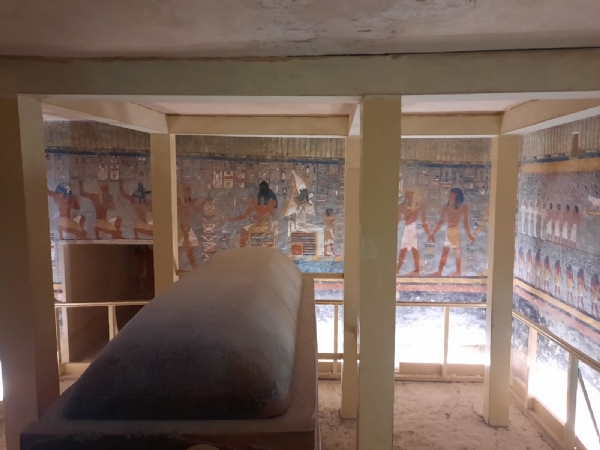
Hindus too pondered over life and death. However, their rishis went beyond materialistic view of life and death and they went into the realms of karma and reincarnation. They didn’t direct people to preserve the body, knowing the five elements have to go back to nature, hence, cremated their bodies. The aatman was said to be immortal, till it merged with the Paramatma. Therefore, we see no grand memorials for the kings. The kings would rather build huge temples of their presiding deities, some even ruled their kingdoms as the servants of their Gods.
Second, more the important lesson is about fighting hard to preserve one’s civilisation. In a light and sound show, the voice over said the tired Egyptian kingdoms couldn’t finally resist the invasions and the glorious civilisation died. The past got buried in mounds of rubble and earth, till the new age colonialists slowly discovered and dug them up for the world. Hard lesson of history is that for a civilization to survive, it must maintain its vitality somehow and keep fighting. Not just Egypt, we find this true of many other civilisations too.
Our forefathers fought hard, struggled hard to save our civilization for us. They kept fighting and kept the flame of civilization burning, never let it be snuffed out even over 1000 years. This is why we are a continuous evolving but never say die civilization. Our civilisation never lost its vitality, renewing itself with new ideas. We find new sects and sampradayas coming up, we find Bhakti maarg covering up for loss of Vedic life. We saw unparalleled valour of our kings who paid a heavy price for refusing to hand over control of our lives and culture to the invaders. It is a different matter that what our forefathers could keep alive, a few generations of Indians almost lost it under British and subsequent secular governments.
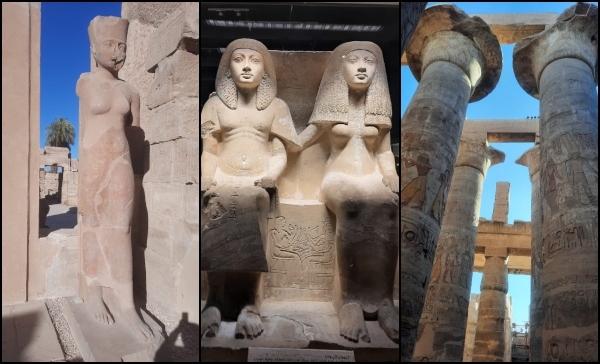
There is still time. Not all is lost. We need to remember that Egyptians made this fatal mistake, our ancients did not. This is why the west loves Egypt and its ancient civilizations; because it ended up in museums. Colonials love ancient civilizations, traditions and cultures dead and embalmed in museums, not alive to tell the tale of their plunder. I wrote long back in my first book, why Hindutva needs to live, because we don’t want to end up in museums to be praised for our great philosophy and culture, to be dusted and brought out in our fineries like Native Indians are in USA on special occasions.
That brings me to the final point. One can see it starkly in Egypt. It is a poor country now with a very rich heritage. Wherever Islamist invaders have gone, they have ravaged not just the ancient civilisations, but also impoverished them. They destroyed the civilisations and their knowledge systems so thoroughly that no trace was left, except in Bharat. Credit again goes to our elders from antiquity and intervening period. Look at the devastation this ideology has cause from Middle East to Africa and again in Europe, including UK.
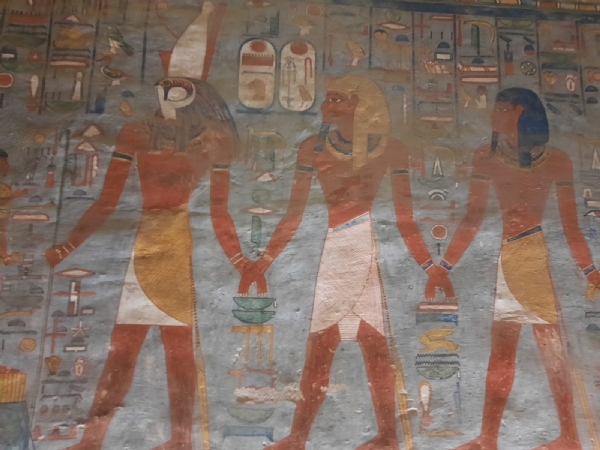
The Islamic countries that have thrived in recent times have done so only due to oil and natural gas; not due to some visionary planning and nurturing of talent. Except Dubai in UAE, I have not seen the innovative spirit to grow and think long term to come out as island of prosperity and keeping Islamists at bay. Others in Middle East have tried to copy it, but none has understood that Dubai also gives some liberty to its people and settlers unlike other countries in the neighbourhood. Now these ‘me too’ countries are also trying to build islands of freedom for foreigners. But they fail to understand that you can’t have selective freedom for outsiders or selected few while common people are oppressed under draconian laws.
It is for the above reasons, that I want Indians to visit Egypt and learn the lessons of history where you learn these lessons for older civilizations in its starkness.
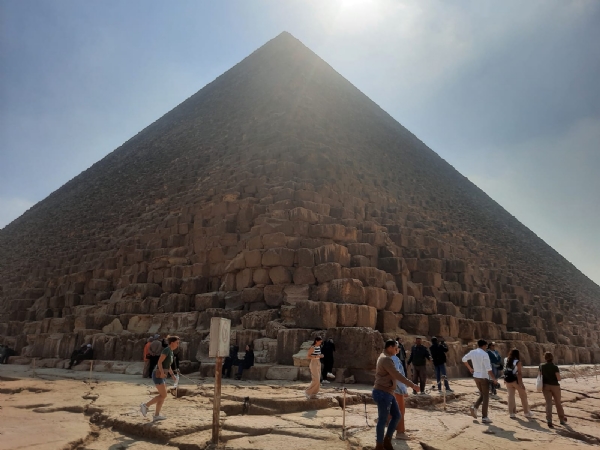
Before I close, I must say that Egyptians like all ancient civilisation, love Indians. They meet and greet you warmly. I have experienced this personally in Jordan, Iran (Persia) and with all the scholars and elders of ancient civilisations and cultures whom I had occasion to meet many times. The ancient wisdom of ‘live and let live’ or ‘ekam sat, vipra bahuda vadanti’, ‘sarvam khalvidam Brahma’ is the key to peaceful co-existence and happy earth.

And I was not disappointed. The grandeur of the temples with huge tall columns and beams on their top, wonderful etched paintings and the exquisite sculptures remind you of our own grand ancient temples, sculptures in Ellora caves, Konark, Mahabalipurm and Brihadeshwar etc.
Not only the technological skills and art of the ancient Egyptians and their life sciences are stunning, their spirituality like all other ancient traditions and cultures is quite close to Hindu philosophy. Respect for nature, deep curiosity about life and life after death, worshipping natural elements as the fountainhead of life are similar to our own Rishis’ views. The mutual respect of the priesthood and kings, dignity of women, their importance in spiritual and material life evident in their work and are similar to Hindu civilisation.
Surprisingly, the symbol of creation, the presentation of God that the Egyptian queen saw in her meditative state is Obelix - the tall columns that you see in their temples with four sides and pyramid like pointed top. In case of Hindus, the column with most powerful energy with no beginning and end is symbolised as Shivling. Geometrically, slightly different, but common imagery of huge column of energy is striking.
Not just are the monuments awe inspiring, they also conveyed many messages and lessons. What differentiates the two great civilisations?
Philosophy of life and death –
From what I could gather - the view of life and death. They were not afraid of death; they were matter of fact about it. Egyptians stopped at material readiness for life after death, with Kings making elaborate plans for their life after death, with deeply dug secret chambers for their graves, the chambers storing all the materials like throne, eatables, other items of necessities for the king to live a good life after death, including graves for their servants in the same vicinity so they would serve them in afterlife. (Earlier the servants would sacrifice themselves to be with the king. Later, it is said, they would be forcibly killed and laid to rest along with the king.) Richer the king, more luxurious the chamber for his grave. Mummification of bodies was part of this philosophy. They not only mummified the king, queens and priests, they also mummified their respected and also pet animals/ birds. They worshipped some animals as image of their gods.

Hindus too pondered over life and death. However, their rishis went beyond materialistic view of life and death and they went into the realms of karma and reincarnation. They didn’t direct people to preserve the body, knowing the five elements have to go back to nature, hence, cremated their bodies. The aatman was said to be immortal, till it merged with the Paramatma. Therefore, we see no grand memorials for the kings. The kings would rather build huge temples of their presiding deities, some even ruled their kingdoms as the servants of their Gods.
One has to pay a heavy price to preserve one’s civilization and values -
Second, more the important lesson is about fighting hard to preserve one’s civilisation. In a light and sound show, the voice over said the tired Egyptian kingdoms couldn’t finally resist the invasions and the glorious civilisation died. The past got buried in mounds of rubble and earth, till the new age colonialists slowly discovered and dug them up for the world. Hard lesson of history is that for a civilization to survive, it must maintain its vitality somehow and keep fighting. Not just Egypt, we find this true of many other civilisations too.
Our forefathers fought hard, struggled hard to save our civilization for us. They kept fighting and kept the flame of civilization burning, never let it be snuffed out even over 1000 years. This is why we are a continuous evolving but never say die civilization. Our civilisation never lost its vitality, renewing itself with new ideas. We find new sects and sampradayas coming up, we find Bhakti maarg covering up for loss of Vedic life. We saw unparalleled valour of our kings who paid a heavy price for refusing to hand over control of our lives and culture to the invaders. It is a different matter that what our forefathers could keep alive, a few generations of Indians almost lost it under British and subsequent secular governments.

There is still time. Not all is lost. We need to remember that Egyptians made this fatal mistake, our ancients did not. This is why the west loves Egypt and its ancient civilizations; because it ended up in museums. Colonials love ancient civilizations, traditions and cultures dead and embalmed in museums, not alive to tell the tale of their plunder. I wrote long back in my first book, why Hindutva needs to live, because we don’t want to end up in museums to be praised for our great philosophy and culture, to be dusted and brought out in our fineries like Native Indians are in USA on special occasions.
Islamist invasions have left in their wake only poverty and destruction -
That brings me to the final point. One can see it starkly in Egypt. It is a poor country now with a very rich heritage. Wherever Islamist invaders have gone, they have ravaged not just the ancient civilisations, but also impoverished them. They destroyed the civilisations and their knowledge systems so thoroughly that no trace was left, except in Bharat. Credit again goes to our elders from antiquity and intervening period. Look at the devastation this ideology has cause from Middle East to Africa and again in Europe, including UK.

The Islamic countries that have thrived in recent times have done so only due to oil and natural gas; not due to some visionary planning and nurturing of talent. Except Dubai in UAE, I have not seen the innovative spirit to grow and think long term to come out as island of prosperity and keeping Islamists at bay. Others in Middle East have tried to copy it, but none has understood that Dubai also gives some liberty to its people and settlers unlike other countries in the neighbourhood. Now these ‘me too’ countries are also trying to build islands of freedom for foreigners. But they fail to understand that you can’t have selective freedom for outsiders or selected few while common people are oppressed under draconian laws.
It is for the above reasons, that I want Indians to visit Egypt and learn the lessons of history where you learn these lessons for older civilizations in its starkness.

Before I close, I must say that Egyptians like all ancient civilisation, love Indians. They meet and greet you warmly. I have experienced this personally in Jordan, Iran (Persia) and with all the scholars and elders of ancient civilisations and cultures whom I had occasion to meet many times. The ancient wisdom of ‘live and let live’ or ‘ekam sat, vipra bahuda vadanti’, ‘sarvam khalvidam Brahma’ is the key to peaceful co-existence and happy earth.


